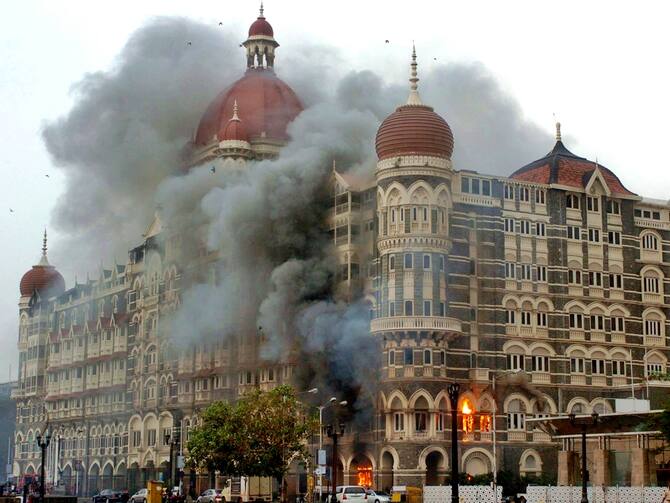On Saturday, External Affairs Minister S Jaishankar asserted that those who planned and oversaw 26/11 Mumbai attacks must be brought to justice.
This was no ordinary statement. It was indeed the pledge of a rising India that rather than being on the receiving end, it would mercilessly hunt down those who had brazenly sought to cow down a civilizational state by deploying uncommon violence against innocents, assuming they were weak and powerless.
Jaishankar was referring to among others, terror group Lashkar-e-Toiba’s Sajid Mir, the main handler of the 26/11 attack, who is yet to be netted. Pakistan had declared Mir dead, but had to acknowledge his presence on its soil under pressure from the Financial Action Task Force (FATF). Others connected with the horrific Mumbai attacks– LeT chief Hafiz Saeed, Zaki-ur-Rehman Lakhvi 26/11 operational commander, and group’s financier Abdul Rehman Makki, are yet to be brought to justice.
It is also evident that China has backed Pakistan’s terror machine targeting India. Beijing has blocked a string of Pakistani terror luminaries at the UN Security council’s 1267 committee, which is a consensus-based forum that can ban terror groups and individuals. The rogues gallery that Beijing has protected includes Sajid Mir, Makki who is Hafez Saeed’s brother-in law , Talah Saeed, the terror patriarch’s son and Jaish-e-Mohammed terror leader Mufti Rauf Azhar.
With 26/11 attacks as the focus, India’s intent to launch a counter-narrative international campaign against terror is visible in plain sight. Last month, it hosted a major UN Security Council’s anti-terrorism meeting. Importantly, the conference was held at Mumbai’s Taj Mahal hotel—the scene of the carnage in 2008, fuelling fresh outrage against the horrendous crime.
Prime Minister Narendra Modi on Saturday said that New Delhi was in no mood to forget 26/11 and move on. Instead, he stressed that, “India can’t forget the wounds of the Mumbai attacks. Now, today’s India is combating terrorism with a new policy and new ways,” he said as tweeted by the external affairs ministry.
Earlier this month, demonstrating his zero-tolerance toward terrorism, PM Modi said at a counter-terror conference: “We consider that even a single attack is one too many. Even a single life lost is one too many. So, we will not rest till terrorism is uprooted.”
In a similar vein, defence minister Rajnath Singh asserted that, “This country has not forgotten the incident of 26/11, nor will it ever forget.” India’s angst is now echoing across the globe.
On Saturday unprecedented protests are planned outside Pakistani missions in many international metropolitan centres including New York and London.
Fully aware that waging an information war was as important as assertive diplomacy to neuter the Pak terror narrative, key civil society groups have also joined the party.
Most notably the breakthrough in building a counter narrative against Pakistan has come with the release of Vivek Agnihotri’s film, Kashmir files. The well documented movie has fundamentally punctured Pakistan’s core argument—that violence in Kashmir is the by-product of people’s aspiration for “Azadi” or freedom. On the contrary, Agnihotri has built a compelling case that Kashmir has been victim of Pak-sponsored genocide perpetrated against the Kashmiri Pundits, and not an arena for self-determination.
Agnihotri’s powerful riposte has triggered memories of Pakistan’s genocide of the Bengalis in Bangladesh, and raised the question that Islamabad is repeating the spirit of the genocidal “operation searchlight” in Bangladesh, now in Kashmir.
The move has also strongly raised the moral appeal of the Kashmir Pandits’ right to return to their ancestral homeland and re-connect with their ancestry.
Besides, Agnihotri’s labours have opened another major avenue—that the emergence of Islam is only one layer in the rich cultural history of Kashmir, which has been for centuries, a cradle of the Hindu and Buddhist civilizations. The specious assumption of “Muslim majority” Kashmir needs to questioned, debated and reconciled through a fresh societal dialogue is implicit in Agnihotri’s narrative.
As India’s counterattack on the information plain gathers momentum, question have begun to be raised about the fault lines inside Pakistan in Balochistan and Sindh.
Within India, there is a crying need that not only 26/11, India needs to wake up to Pak sponsored terrorism which saw hideous expression in the failed parliament attack in 2001, Mumbai terror bombings of 1993, the sponsorship of the Khalistani movement, the Pathankot and Pulwama attacks to name a few.
Right now New India is building its powerful counternarrative against external forces and their fifth columnists inside the country, who have tried to camouflage naked terrorism with the fig leaf of human and minority rights, taking advantage of lacunas in India’s legal system and an intellectual culture that is grounded in its opposition to the Indian State. The riposte to all this is brewing and will be unleashed with jaw dropping ferocity sooner than later.
indianarrative

